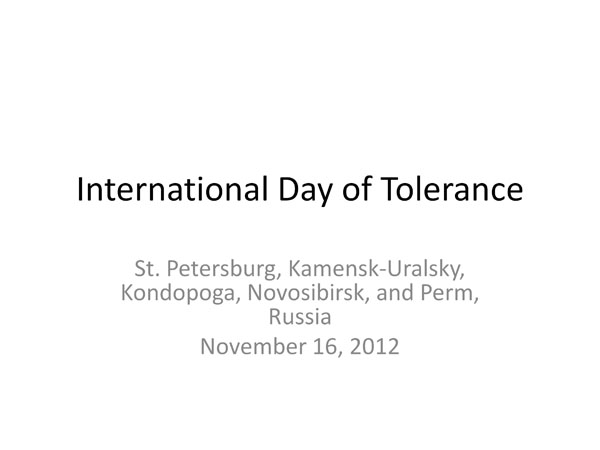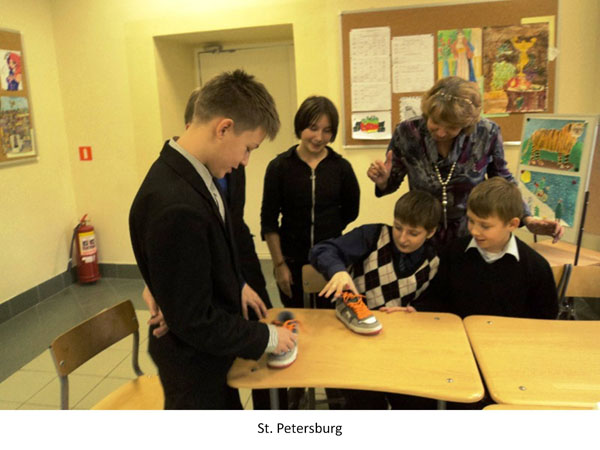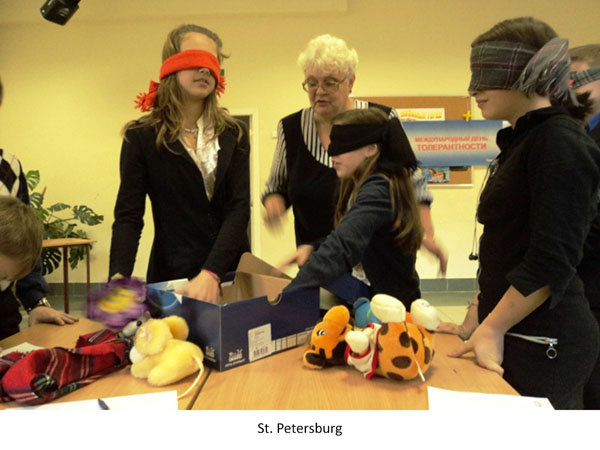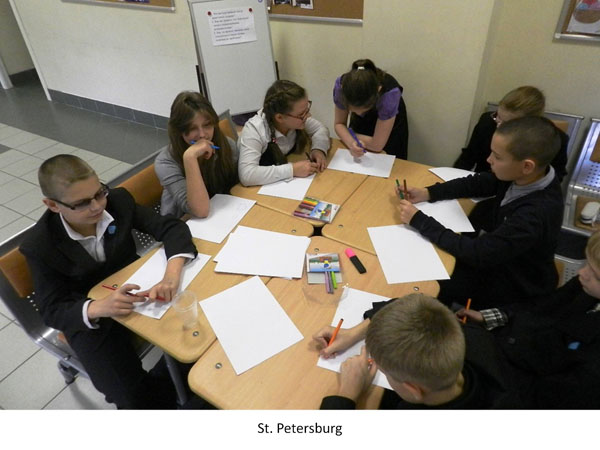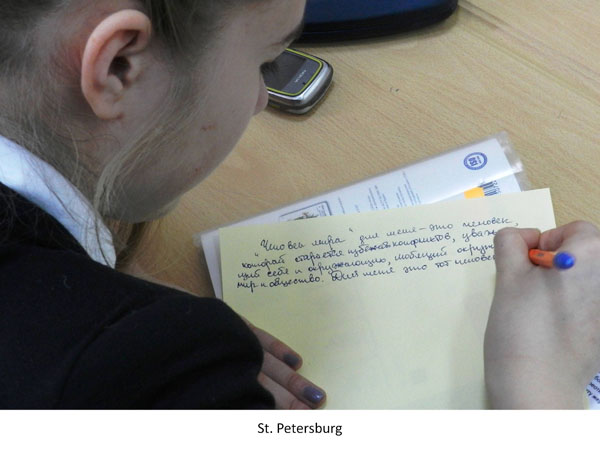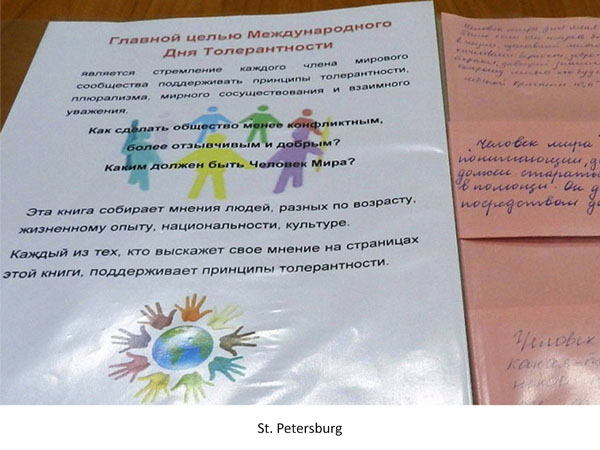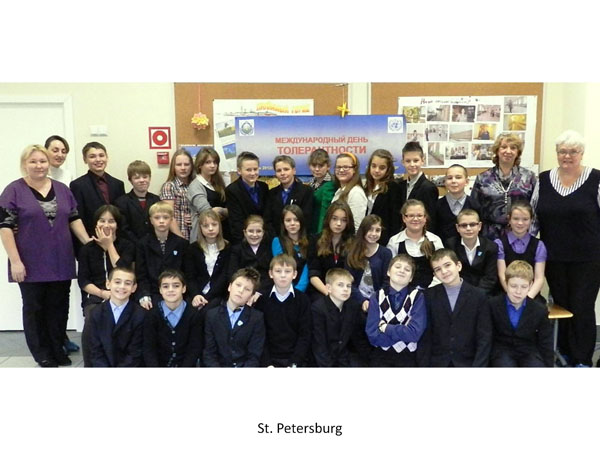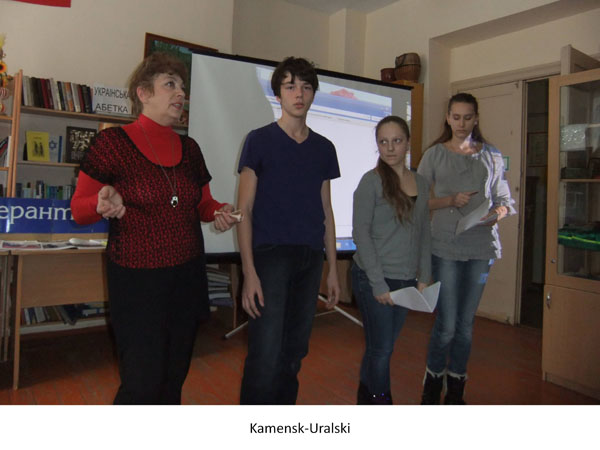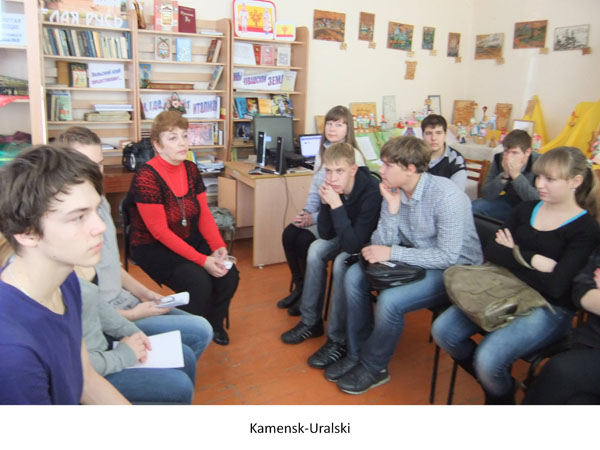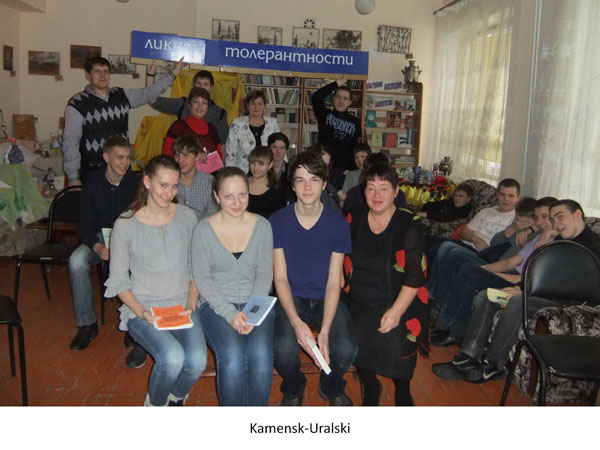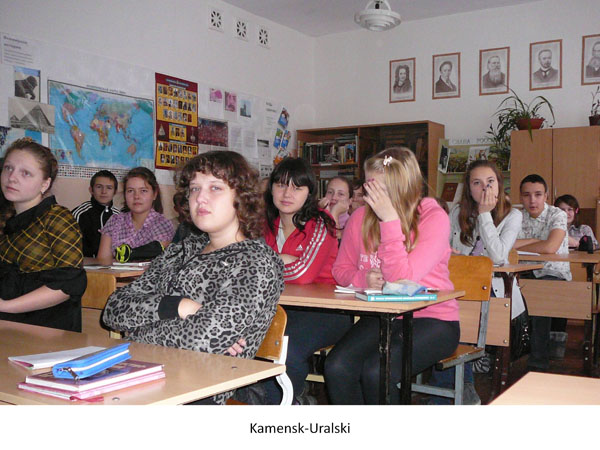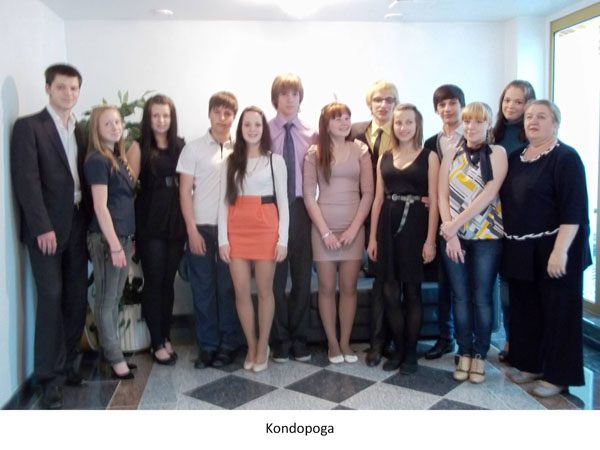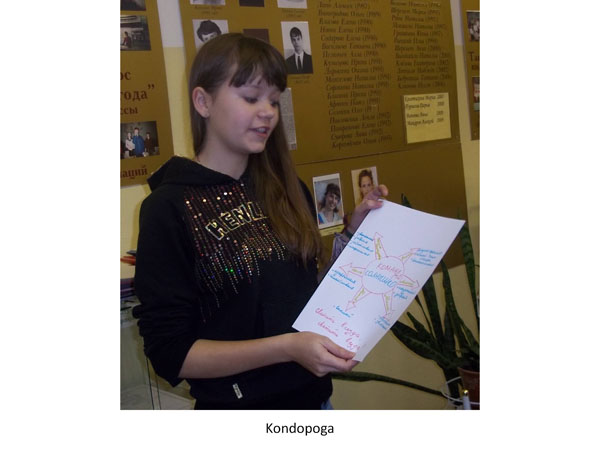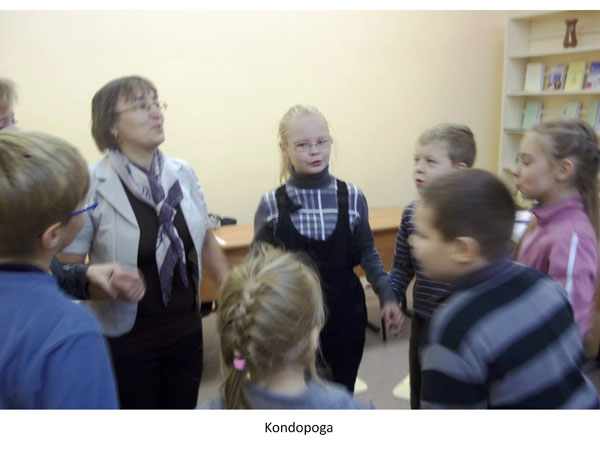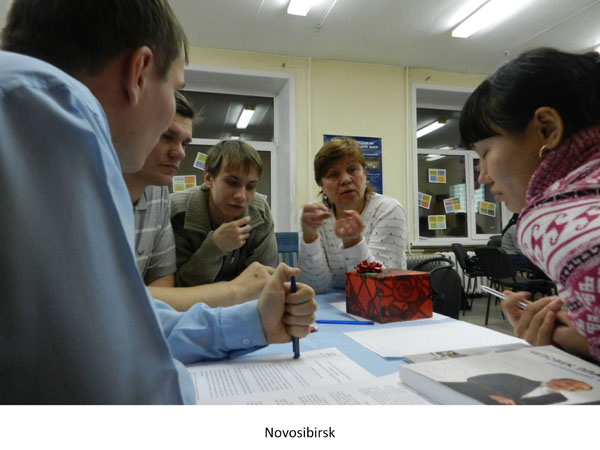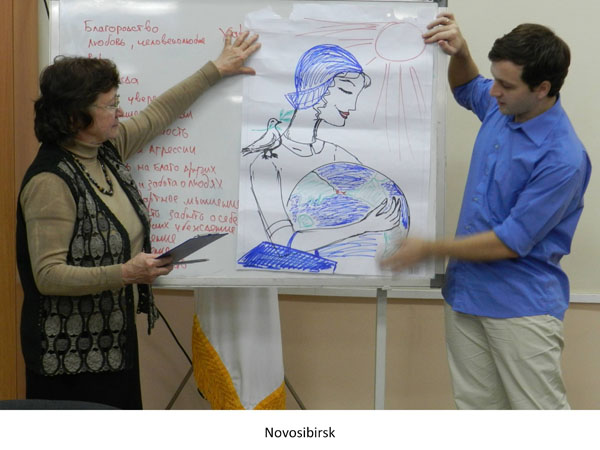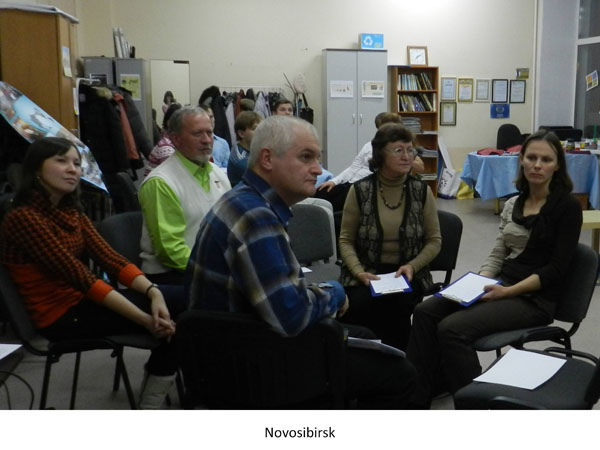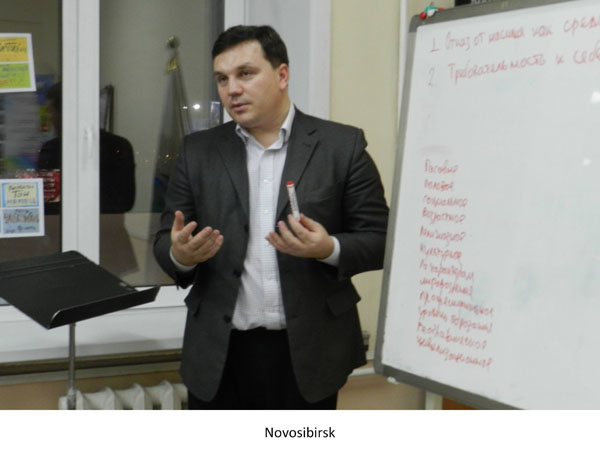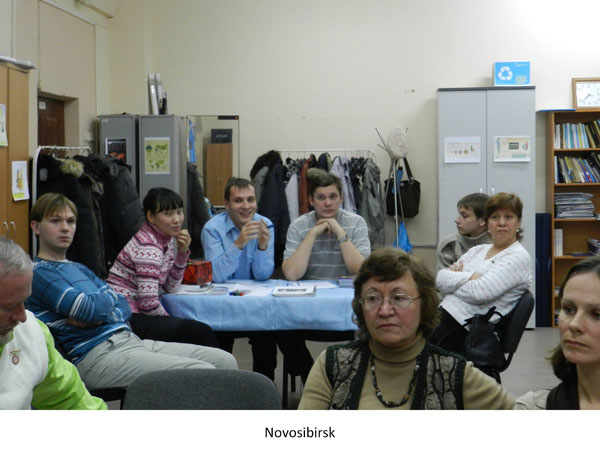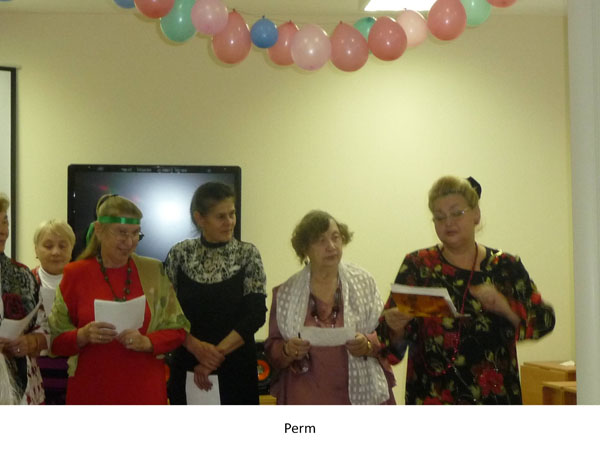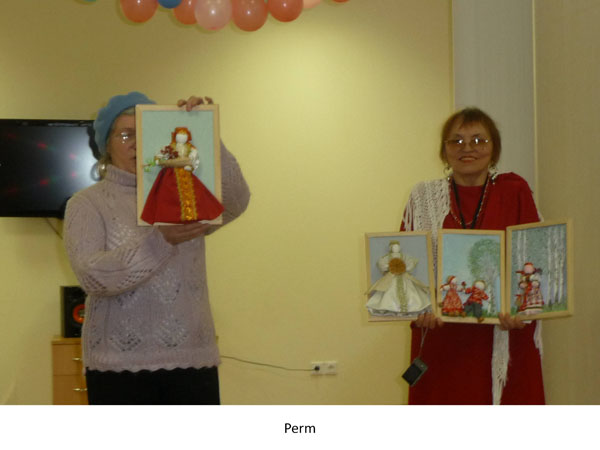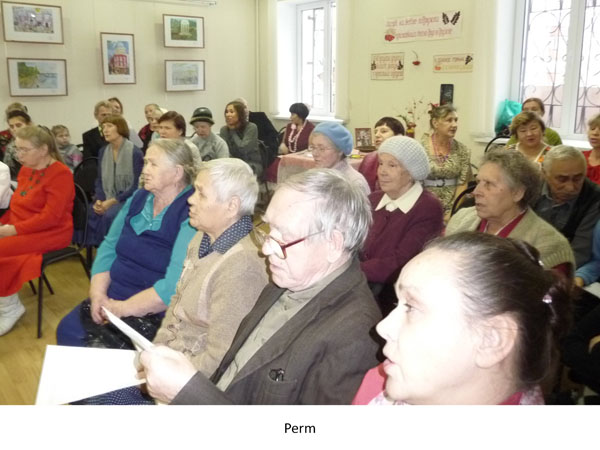Day for Tolerance Observed in 10 Russian Cities
Written by UPF - Russia
Friday, November 16, 2012
The International Day for Tolerance was commemorated with educational activities in St. Petersburg and Kondopoga, cities in the northwest part of Russia; Kamensk-Urals and Perm in the Urals area and Ufa in the southern Urals; and Novosibirsk in Siberia. In addition, "Run Hour" activities publicized the Day of Tolerance in Moscow, Kazan, Nizhnevartovsk, and Yekaterinburg.
The Declaration of Principles for Tolerance was approved by the UNESCO member-states on November 16, 1995, and the following year the UN General Assembly declared the International Day for Tolerance, to be observed annually on November 16.
St. Petersburg
This year, the International Day for Tolerance was celebrated at school No. 77 of the Petrogradsky District of St. Petersburg. Together with the UPF chapter of northwest Russia, the high school students prepared a symbolic book “A Man of Peace,” in which children, teachers and parents could write down their opinions on “How to solve conflict situations in society," “How to inspire people to be more responsive and kind to each other,” and "What kind of person is a man of peace?”
The book collected opinions about people of different walks of life, different faiths, nationalities and cultures. For example:
- “A Man of Peace in my mind is a tolerant, responsive, understanding, and kind person. He helps those in need. He can solve conflicts peacefully, through dialogue.”
- “A Man of Peace for me is Bob Marley. He always promoted peace and hated evil.”
Representatives of the Universal Peace Federation conducted the game “All Are Different – All Are Equal” for 6th-form students. They were divided into three groups and were asked to perform a number of activities under certain limitations. There were three “stations”:
Station of the blind. With their eyes closed, they were to fill boxes with toys and then carry them to the indicated place.
Station of the deaf. With ears closed, they were to try to understand a task and carry it out (a drawing).
Station of people with limited faculties (one arm rigid). The participants were to lace up their sports shoes, tie a scarf, and fasten a belt around their waist with one hand.
Participants described their feelings after each “station.” They wrote down their answers to the questions of the game on a special sheet of paper that showed the outline of a hand. Among the questions were: What did you feel carrying out your task? Was it easy for you? How should one treat persons with limited faculties?
Finally, there was a discussion of the game results. Children shared their feelings, perceptions, and conclusions based on their own experiences. All came to the conclusion that people should always offer to help people with limited faculties.
Two more games will be conducted by UPF activists for 6th-form students of school No. 66 at the House of Creativity located in the Petrograd District on November 20 and 22.
Kamensk-Urals
A program on the theme “Tolerance: pro and con” took place in the Sverdlovsk region with the support of UPF-Urals on November 15. Eighth and ninth-formers from lyceum No. 9 together with first-year students of the polytechnical college participated in a discussion of “What should be our attitude toward people with limited faculties and newcomers?” Issues of interactions with such categories of people are quite timely. The meeting was a result of the work of children and adults on issues of tolerance.
In preparing for the event, participants did polling among their peers and prepared creative works (posters, drawings, and poetry). These materials were used in the course of the discussion. The issues under discussion were not unexpected, but still the children showed sincere interest. As a result, the participants in the discussion came to the conclusion that both handicapped people and newcomers need attention and care; they need assistance and support in different practical situations. Therefore, it was decided to organize a project in support of invalids on December 3.
Kondopoga
In Kondopoga, Young Ambassadors for Peace conducted a number of classroom sessions on “A Citizen of the World,” accompanied by a number of presentations and a survey; There were eight multimedia presentations at schools and at the college. Such events formed an integral part of the project “A Citizen of the World” that will be brought to a close in May 2013, on the 75th anniversary of the founding of Kondopoga, a city of about 33,000 people in the Republic of Karelia, with the final activity “Praising Our City.”
Young Ambassadors for Peace prepared all materials for the presentations themselves, both texts and photos. Here is one of the presentations.
The first step in preparing for the celebration of the International Day for Tolerance was a detailed discussion concerning composition and format of the program.
Children’s comments:
- “I like discussions. It is interesting to work in a group. I am ready to participate in the project.”
- "I thought talks about politics were not interesting. Now I have a different opinion.”
- “I am ready to cooperate. I perceived the essence of the project, and I like it.”
Among the participants of the events were high school children, members of the student government, and Young Ambassadors for Peace.
Novosibirsk
The academic exercise “Living in peace with others” was held in the office of Universal Peace Federation of Novosibirsk on November 16. Before the meeting there was a web-survey on “What kind of tolerance is more needed in modern society?” 48.4% of respondents named national tolerance; 25.4% indicated religious tolerance in relations between followers of different confessions as the most important; 19.4% marked lack of tolerance in the milieu of teachers. It is interesting to note that 6.5% consider it important to rise up the level of tolerance in the field of politics.
Participants were informed about recent projects of the Universal Peace Federation, difficulties in connection with creating the Russian identity, and promoting the role of economics and spirituality on the towards universal peace.
The exercise was followed by discussion on the issues of demographic components in modern society and the problem of non-traditional sexual orientation. They discussed the following issues: How to deal with non-traditional sexual orientation among the younger generation? How to convince young people of the importance of family values? Finally, the participants came to a common opinion about necessity to teach people of tolerance.
Perm
A meeting on the theme “The Ash Tree of the Urals” in support of the International Day for Tolerance took place in the Public Center of the district of Chkalovsky in Perm on November 15. It was initiated by the Perm Public Center in cooperation with the local chapter of UPF.
At first glance, it was difficult to guess in what manner the event could reflect values of the day. Some women activists were inspired by a series of free master-classes in needlework conducted by L.P. Kuklina, president of the local Women's Federation for World Peace. In October the women mastered ash tree patterns so well that they decided to make them the theme of their next needlework session because the ash tree has always been poetically associated with Ural women. Mrs. Kuklina approved the initiative and offered to make it a part of the wider celebration of the International Day for Tolerance. She described tolerance as an active, heart-felt embrace of differences and encouraged women to be examples of understanding, empathy, and tolerance.
The meeting was opened by a discussion on “Women and Tolerance” conducted by Mrs. Kuklina. Women of the elder generation who suffered many dramatic experiences during their life course played a significant role. Their experiences during the hard times of the Great Patriotic War and the post-war period could serve as lessons for younger people. For example, in war times, they shared their scanty food stores with German captives who were prisoners in their locations, in spite of the fact that they had their families to feed.
The guests of the event were offered local meals; they were told legends and listened to poetry and humorous rhymes about the ash tree. A doctor of the local clinic shared recipes for preparing dishes made from ash berries. Then the audience enjoyed dances performed by a Public Center dancing group. The Perm poetess Raissa Kamenskikh recited poems of Marina Tsvetayeva. Lyudmila Ushakova, leader of the local department for relations with public organizations, welcomed the participants. The beautiful needlework displayed at the event will be used in other charitable projects. At the end of the meeting guests shared informally over tea and refreshments made with ash berry jam
Ufa
Youth Ambassadors for Peace in Ufa organized a social project for homeless children on the UN International Day of Tolerance, November 10-11. To read out to homeless children who appear to be living in difficult circumstances and have no families, organizers got in touch with a grassroots organization that helps homeless children, “Vozmozhnost.” It is working to establish a social center for children in critical or difficult family situation, a place where they can come during the day, eat meals, and get psychological and material support.
On November 10, seven Youth Ambassadors for Peace and one girl from Vosmozhnost asked the manager of a wholesale store for donations of food, and he gave them about 50 kg of various types of food. The next day they appealed to people living nearby for donations of clothing. People willingly donated lots of warm clothing for children and teenagers. The food and clothing that were collected were brought to Vozmozhnost and distributed among the children.
Through this project, the volunteers gained a sense that these were not just "someone's" children but all are part of one family. With such an attitude the problems of homeless children can be resolved.
If you find this page helpful and informative please consider making donation. Your donation will help Universal Peace Federation (UPF) provide new and improved reports, analysis and publications to you and everyone around the world.
UPF is a 501(c)(3) tax exempt organization and all donations are tax deductible in the United States. Receipts are automatically provided for donations of or above $250.00.
|
Donate to the Universal Peace Federation: Your donation to support the general programs of UPF. |
Donate to the Religious Youth Service (RYS): Your donation will be used for service projects around the world. |
Donate to UPF's Africa Projects: Your donation will be used for projects in Africa. |

